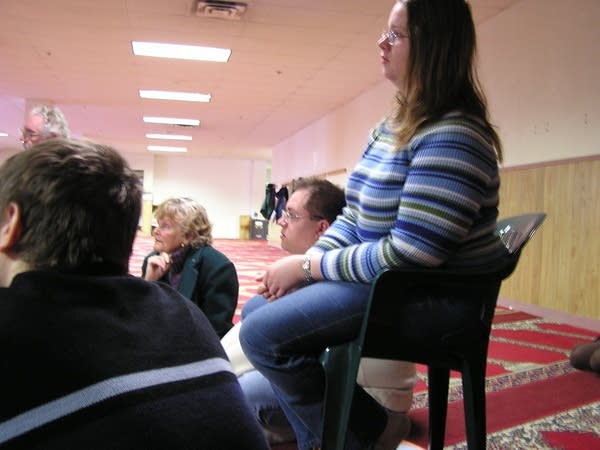Rochester's Muslims reach out
Go Deeper.
Create an account or log in to save stories.
Like this?
Thanks for liking this story! We have added it to a list of your favorite stories.

It's a dreary Saturday morning, and a group of 10 visitors have gathered at the back of the mosque. Marie Wynne Miller is one of them. She's listening to a very detailed history of Islam. The facilitator is explaining Allah's deep sense of justice. Another man, and then the imam, in Arabic, chime in.
The meeting has already lasted over an hour. Finally, Miller takes a break in the chatter to ask a question about culture and practice. Do they influence one another?

For example, a Muslim exchange student who lived with her always washed her hands before prayer in the morning.
"And to my knowledge she did not dry her hands. Okay, that's one little habit. Maybe that just fit into her aspect of Muslim religion. And she certainly didn't speak Arabic either," Miller explains.
Turn Up Your Support
MPR News helps you turn down the noise and build shared understanding. Turn up your support for this public resource and keep trusted journalism accessible to all.
"Just the washing of the hands or the whole thing?" a community member asks.
"Oh, no, the other part seems reasonable to me," Miller responds.
A few people try to answer Miller, but they only talk about the hand-washing. She wants more.
The call to prayer comes and the session breaks up.
"If I put myself in the shoes of a non-Muslim who is living here, what I hear from the media and newspaper and all these things, I'm going to have the worst opinion about Muslims."
Miller puts on her jacket. She says news about the war in Iraq and the war on terror has filled her with questions about violence and practice. She says none of that was addressed. "There are so many sects, of the religion when I read about it. And they didn't speak of these. And I really would like to ask about the different sects," Miller says.
Differences aren't the focus of these meetings, according to Rashed Ferdous -- it's the similarities. Ferdous runs the open houses. Ferdous says Rochester is a welcoming city, but people have justified questions about Islam.
"If I put myself in the shoes of a non-Muslim who is living in here, what I hear from the media and newspaper and all these things -- I mean, I'm going to have the worst opinion about Muslims," Ferdous explains. "Knowing that, I can't say he's prejudice. He's just ignorant. If someone say, hey why are you guys terrorists? That's an ignorant question. It's not a bad question."
Ferdous says he's battling ignorance, not prejudice. He believes the best way to do that is to build relationships.
"Muslims know about churches, that is Muslims living here. It's normal, isn't it, because there is only one mosque and how many Muslims? So the opportunity for the other way, knowledge transfer, is less," he says.
University of Minnesota sociology professor Liz Boyle says numbers and opportunity aren't the only components to this issue. It's really about a minority group, in this case Muslims, convincing a majority group to accept them.

"They also have no standing to say, 'Your ideas about me are wrong.' If I have an idea about someone who has less status than me, and that person says, 'Hey wait, you're wrong about me, I'm really a good person.' Well, I say, 'Well, of course you're going to say that because it's in your interest to say that,'" Boyle says.
Boyle says it sounds good to say Muslims are responsible for changing stereotypes of Muslims, but she says realistically, it doesn't work.
For example, she's heard a lot of people say, why didn't Muslims speak out against the Sept. 11, 2001, terrorist attacks? Why aren't they speaking out against the violence in Iraq?
"If you look at what was going on in the months following September 11th, and indeed in the years following September 11th, there's been lots of mobilization in the Muslim migrant community," says Boyle. "I just don't think the dominant society sees it, because almost by definition Muslim migrants are outside the dominant society."
Boyle says getting a good job and climbing the economic ladder does a lot more for social acceptance than any informational meeting. Boyle isn't sure if today's economy can provide that quickly. But she says the real divide tends to rest on race and class.
In the long term, she says Americans like people to be religious. It doesn't tend matter which religion a person chooses.
This seems to be already happening in Rochester, where good jobs are plentiful. However, the members at the Rochester mosque say they will continue inviting in non-Muslims for conversation.
Dear reader,
Political debates with family or friends can get heated. But what if there was a way to handle them better?
You can learn how to have civil political conversations with our new e-book!
Download our free e-book, Talking Sense: Have Hard Political Conversations, Better, and learn how to talk without the tension.





